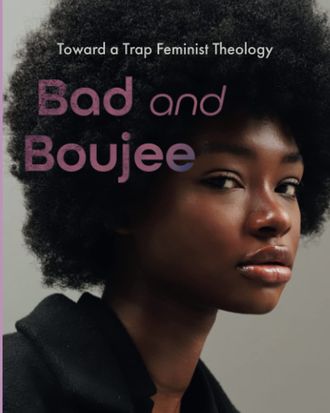
Two months after its publication and days after online criticism took hold, the book Bad and Boujee: Toward a Trap Feminist Theology — written by Jennifer M. Buck, a white woman, and featuring a Black woman on its cover — has been canceled, says its publisher.
Buck, a theology professor, has been accused of cultural and racial appropriation, carelessness in (or a lack of) crediting prior research, and deleting said criticism from her social accounts and Amazon pages.
Here’s what we know so far.
Who is Jennifer M. Buck?
Buck is the author of Bad and Boujee: Toward a Trap Feminist Theology and a professor of practical theology at Azusa Pacific University. According to its Amazon description, the book “engages with the overlap of black experience, hip-hop music, ethics, and feminism to focus on a subsection known as ‘trap feminism’ and construct a Trap Feminist Theology.” It also states that “Trap feminism emerges out of trap culture, where the black woman is creating a space outside of the barriers of poverty harnessing autonomy, employment, and agency to allow for a reinvention of self-identity while remaining faithful to social location.”
Buck, a white woman, has taught the course “Trap Feminist Theology” at Azusa Pacific since 2017.
What is “trap feminism”?
The term trap feminism was first coined by gender-studies scholar and entertainment writer Sesali Bowen in 2014 and encompasses what she calls the “complex, sex-positive, financially ambitious, and self-affirming components” of trap music, a synth- and drum-heavy subgenre of hip-hop that Bowen characterizes as “anthems for drug dealers and the perfect backdrop for urban strip clubs.”
Since her initial post on the subject, published on the blog Feministing, Bowen has written extensively about trap feminism for numerous outlets and in 2021 published the book Bad Fat Black Girl: Notes from a Trap Feminist. She is the host of the queer- and female-focused rap podcast Purse First.
What was the criticism against Bad and Boujee?
The backlash to Bad and Boujee seems to have begun with an Instagram comment by Jo Luehmann, a Christian podcaster and writer. On a post Buck made to promote the book (which Luehmann says was later deleted), Luehmann commented, “Hello! Can you help me understand how you are qualified to write this book?” Buck replied by DM, writing that she had interviewed “women running trap with a research team of primarily black women” who were “paid well.” Buck added, “I believe anti-racist work is the work of white people to do, which includes hiring and elevating black voices and all historically marginalized voices in doing theology.”
Luehmann shared screenshots of their interactions on her own Instagram Stories, which gained further attention when a Christian podcaster with the username @thepursuinglife directed her followers to Luehmann’s Instagram, claiming Buck had been deleting critical comments and bad Amazon reviews. The book’s Amazon page currently has just a single one-star review, though the publisher, Wipf and Stock, told reporter Mitchell Atencio that it has “not made any attempts to pull or delete reviews on Amazon.”
As these critiques gained momentum, Bowen reached out to Buck to inquire about her work and her use of the term trap feminism. A screenshot shows Buck’s response: “you have a footnote in my book because my research assistant turned me onto your work.” Bowen calls this claim “truly embarrassing on her part,” not to mention difficult to believe, given that the entire first page of Google results for “trap feminism” are either by or about Bowen.
A number of Black academics and authors subsequently shared their frustration with Buck’s work. Ph.D. candidate Deirdre “Jonese” Austin tweeted that the controversy is indicative of what she calls a larger problem within academia, wherein “a scholar or academician can focus on any community they choose to do so in completing their research.” Chanequa Walker-Barnes, the author of I Bring the Voices of My People: A Womanist Vision for Racial Reconciliation, added that white scholars writing about Black women “has to be done with extreme care, a whole lot of cultural sensitivity and humility, and in relationships of accountability with Black women.” Critics also took issue with Yale University, which appears to have given Buck a $10,000 grant to support the book’s research in 2017.
Why was Bad and Boujee pulled from publication?
Although the book’s publisher, Wipf and Stock, an Oregon-based company that focuses on theology, biblical studies, history, and philosophy, announced it would pull Bad and Boujee: Toward a Trap Feminist Theology from shelves on April 14, it has not yet provided a public statement about its reasoning.
“I don’t think the publisher had any other choice” but to pull the book, says Bowen. “There is a level of responsibility that they have to take in getting the book published. A lot of the skepticism was directed just as much at them — and at Yale, who gave the $10,000 grant for the research — as it was toward Jennifer Buck.”
“I’m glad they pulled the book, but this is a bigger conversation,” says Luehmann. “It’s not just about pulling this one book. It’s about the different practices they need in place to make sure these things don’t happen again, and to make sure they have diverse voices in their editorial and leadership teams,” she said, adding: “Speaking over voices of marginalized people is not anti-racist work.”
Buck seems to have made her Instagram account private in recent days and did not immediately respond to the Cut’s request for comment.
This post has been updated.





